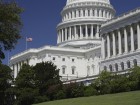
FERC Announces Agenda for Webcast Technical Conference
On March 18, 2020, the Federal Energy Regulatory Commission (FERC) published the agenda for their upcoming technical conference on the use of XBRL for forms submissions, which takes place March 24 – 26, 2020. On March 13, 2020, a notice was issued announcing that the technical conference will no longer be an in-person conference. All […more]














